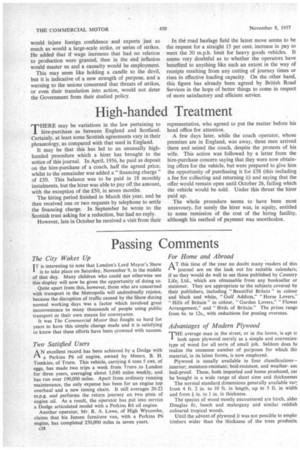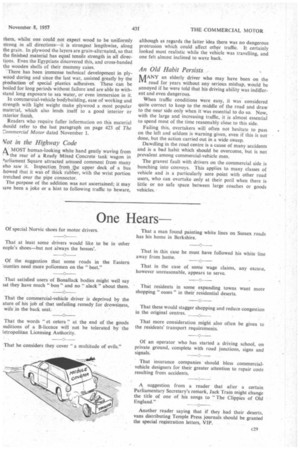Passing Comments
Page 78

Page 79

If you've noticed an error in this article please click here to report it so we can fix it.
The City Wakes Up
IT is interesting to note that London's Lord Mayor's Show I is to take place on Saturday, November 9, in the middle of that day. Many children who could not otherwise see this display will now be given the opportunity of doing so.
Quite apart from this, however, those who are concerned with transport in the Metropolis will undoubtedly rejoice, because the disruption of traffic caused by the Show during normal working days was a factor which involved great inconvenience to many thousands of people using public transport or their own means for conveyance.
It was The Commercial Motor that fought so hard for years to have this simple change made and it is satisfying to know that these efforts have been crowned with success.
Two Satisfied Users
A N excellent record has been achieved by a Dodge with a Perkins P6 oil engine, owned by Messrs. B. H. Tomkins, of Truro. This vehicle, carrying 6 tons 5 cwt. of eggs, has made two trips a week from Truro to London for three years, averaging about 1,040 miles weekly, and has run over 190,000 miles. Apart from ordinary running maintenance, the only expense has been for an engine top overhaul and a new timing chain. It still averages 20-22 m.p.g. and performs the return journey on two pints of engine oil. As a result, the operator has put into service a Dodge articulated model with a Perkins R6 oil engine.
Another operator, Mr. R. A. Lowe, of High Wycombe, claims that his Jensen furniture van, with a Perkins P6 engine, has completed 250,000 miles in seven years.
c28
For Home and Abroad
AT this time of the year no doubt many readers of this
journal are on the look out for suitable calendars; if so they would do well to see those published by Country Life, Ltd., which are obtainable from any bookseller or stationer. They are appropriate to the subjects covered by their publishers, including "Beautiful Britain" in colour and black and white, "Golf Addicts," "Horse Lovers," "Hills of Britain" in colour, Garden Lovers," "Flower Arrangement," and "Birds of Britain." The prices range from 6s. to 12s., with reductions for posting overseas.
Advantages of Modern Plywood
1HE average man in the street, or in the home, is apt tc
look upon plywood merely as a simple and convenien type of wood for all sorts of small job. Seldom does h( realize the immense number of purposes for which thi! material, in its latest forms, is now employed.
Plywood is usually available in four classifications— interior; moisture-resistant; boil-resistant, and weatheran boil-proof. These, both imported and home produced, cat be bought in a wide range of sheet sizes and thicknesses The normal standard dimensions generally available van from 4 ft. 2 in. to 10 ft. in length, up to 5 ft. in width and from + in. to 1 in, in thickness.
The species of wood mostly encountered are birch, alder Douglas fir, beech and mahogany and similar reddish coloured tropical woods.
Until the advent of plywood it was not possible to emplo: timbers wider than the thickness of the trees producin, them, whilst one could not expect wood to be uniformly strong in all directions—it is strongest lengthwise, along the grain. In plywood the layers are grain-alternated, so that the finished material has equal tensile strength in all directions. Even the Egyptians discovered this, and cross-banded the wooden sheik of their mummy cases.
'There has been immense technical development in plywood during and since the last war, assisted greatly by the production of special plastics adhesives. These can be boiled for long periods without failure and are able to withstand long exposure to sea water, or even immersion in it.
In commercial-vehicle bodybuilding, ease of working and strength with light weight make plywood a most popular material, which also lends itself to a good interior or exterior finish.
Readers who require fuller information on this material should refer to the last paragraph on page 423 of The :ommercial Motor dated November 1.
"lot in the Highway Code
A MOST human-looking white hand gently waving from
the rear of a Ready Mixed Concrete tank wagon in 'arliament Square attracted amused comment from many vho saw it. Inspection from tile upper deck of a bus ,howed that it was of thick rubber, with the wrist portion tretched over the pipe connector.
The purpose of the addition was not ascertained; it may lave been a joke or a hint to following traffic to beware, although as regards the latter idea there was no dangerous protrusion which could affect other traffic. It certainly looked most realistic while the vehicle was travelling, and one felt almost inclined to wave back.
An Old Habit Persists
NA ANY an elderly driver who may have been on the ALL road for years without any serious mishap, would be annoyed if he were told that his driving ability was indifferent and even dangerous.
When traffic conditions were easy, it was considered quite correct to keep to the middle of the road and draw to the near side only when it was essential to do so. Now, with the large and increasing traffic, it is almost essential to spend most of the time reasonably close to this side.
Failing this, overtakers will often not hesitate to pass on the left and seldom is warning given, even if this is not done, but the action carried out in a wide sweep.
Dawdling in the road centre is a cause of many accidents and is a bad habit which should be overcome, but is not prevalent among commercial-vehicle men.
The gravest fault with drivers on the commercial side is bunching into convoys. This applies to many classes of vehicle and is a particularly sore point with other road users, who can overtake only at their peril when there is little or no safe space between large coaches or goods vehicles.




























































































































































































































































